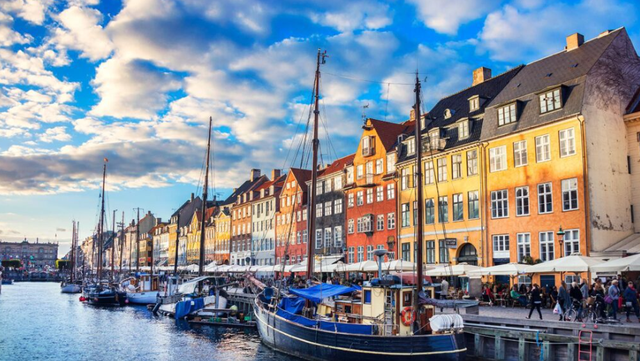
 Flash News
Flash News
Horror scenes in the Tirana Morgue, decomposed bodies with worms! 18 bodies 'folded' into two 4-seat refrigerators
Korçë/ Një grua bie në kontakt me energjinë elektrike
Albanian woman was killed by ex-husband, brother: She had reported him for violence, no one intervened
Iranian military says it struck Israeli military intelligence center in Tel Aviv
SP MP leaves SPAK, shuts up about the media: I can't speak
The best cities to live in the world, Vienna falls from the throne again

It's official. Vienna is no longer the best city to live in the world.
After three consecutive years at the top of the annual list compiled by the Economist Intelligence Unit (EIU), the Austrian capital has been overtaken by Copenhagen.
The capital of Denmark has taken first place in the ranking of the best cities to live in the world for 2025.
The EIU ranked 173 cities around the world based on several factors, including healthcare, education, stability, infrastructure and environment.
Copenhagen triumphed after receiving "perfect" ratings for stability, education and infrastructure, while Vienna came in second place, along with the Swiss city of Zurich.
Melbourne, Australia, retained fourth place, while Geneva, Switzerland, ranked fifth on the list.
Just outside the top five, Sydney in Australia made significant progress, moving up from seventh to sixth place. Meanwhile, the Japanese city of Osaka and Auckland in New Zealand share seventh place.
In ninth place is Adelaide, making it the third Australian city in the global top 10. The list closes with Vancouver, Canada, in tenth place.
Decline in ratings for some cities
The report also notes that a number of cities have suffered a decline in their rankings, driven by factors such as social unrest, political tensions, or challenges in the healthcare and infrastructure sectors. These movements reflect dynamic changes in the quality of urban life in a world in constant transformation.
Why did Vienna lose first place this year?
Although Vienna maintained high scores in most categories, it suffered a significant drop in its stability rating – a factor that directly contributed to its loss of first place. In contrast, Copenhagen received high and consistent ratings in all categories.
According to the report, the "sharp and unexpected" drop in Vienna's stability score is attributed to recent events, including a bomb threat during a Taylor Swift concert last summer, which led to the cancellation of the event.
“Global livability has remained unchanged over the past year and, similar to 2024, stability ratings have declined globally,” said Barsali Bhattacharyya, industry sector director at the EIU.
Significant declines for other cities as well
Vienna wasn't the only city to suffer a drop in a category where it had previously excelled. Calgary, which ranked fifth in 2024, fell out of the top 10 this year, dropping to 18th place. The reason? Its lower rating for healthcare, a problem that also affected three other Canadian cities.
Toronto also lost positions in the rankings, dropping from 12th to 16th, for exactly the same reason.
"This reflects the reality of long waiting lists for medical check-ups," Barsali Bhattacharyya of the EIU told CNN Travel.
"There is a shortage of staff in medical centers and hospitals."
The EIU report shows that even cities with a consolidated reputation for quality of life can be hit by unexpected structural challenges – especially in critical sectors like healthcare.
In the United Kingdom, cities such as London, Manchester and Edinburgh have fallen significantly in the rankings due to declining scores in the stability category.
This decline comes after a period of unrest and uncertainty last year, fueled by a disinformation campaign against immigrants, following a knife attack in Southport, northern England.
In this year's list, London fell from 45th to 54th, Manchester from 43rd to 52nd, and Edinburgh from 59th to 64th.
The EIU notes that, as in 2024, stability was the category that experienced deterioration worldwide. Political crises, social tensions and violent incidents are exerting a direct impact on the perception and reality of urban liveability./ Monitor
Latest news


Korçë/ Një grua bie në kontakt me energjinë elektrike
2025-06-17 20:55:40

Vdekja nuk të bën as të mirë, as të keq
2025-06-17 20:38:05
Only 1 in 5 tourists sleep in apartments or hotels
2025-06-17 20:25:16

European Commission proposes complete ban on Russian gas imports
2025-06-17 19:46:58
'Serious concern': EU condemns government attacks on SPAK after Veliaj's arrest
2025-06-17 19:36:01
Fuel prices soar amid Israel-Iran tensions
2025-06-17 19:19:12



Iranian military says it struck Israeli military intelligence center in Tel Aviv
2025-06-17 18:17:27
The recount of 94 boxes of Gramsh and Peqin is completed
2025-06-17 18:08:47
Source: The world order is destroyed, how is the world being run today
2025-06-17 17:50:28

Albania and Serbia begin evacuations from Israel, Kosovo no clarification
2025-06-17 17:20:50
Exports have no power to recover, businesses suspend investments
2025-06-17 17:10:36
Atlanta United close to deal with Albania international center back
2025-06-17 16:59:03
The Bridge over the Buna hostage to bureaucracies
2025-06-17 16:50:46
'The White Horse of Celibashi'
2025-06-17 16:40:25
SP MP leaves SPAK, shuts up about the media: I can't speak
2025-06-17 16:29:15
Why was Belgium chosen for the Special Court convicts to serve their sentences?
2025-06-17 16:21:46
'Bunker-busting' bombs and Iran's nuclear base on a mountain
2025-06-17 16:18:53
Mother and daughter rape 14-year-old girl in Tirana
2025-06-17 16:08:15
Extreme temperatures, here are the foods you should eat to cope with the heat
2025-06-17 16:00:17


Cannabis was found on him, 20-year-old arrested in Vlora
2025-06-17 15:24:17
A dead body is found on "Bulevardi i Ri" in Tirana
2025-06-17 15:21:09
Fire in Elbasan, OST buildings engulfed in flames
2025-06-17 15:05:29

Egnatia learns the opponent in the Champions League
2025-06-17 14:55:26
Murder of Pjerin Xhuvani in Elbasan, Arbër Paplekaj requests conditional release
2025-06-17 14:45:24
The best cities to live in the world, Vienna falls from the throne again
2025-06-17 14:36:54
Plarent Ndreca summoned to the GJKKO
2025-06-17 14:31:16
Requests conditional release, hearing for Ervin Salianji postponed
2025-06-17 14:17:35
5 Albanians evacuated from Israel, expected to return to Albania
2025-06-17 14:06:31




Israel-Iran War/ Analysis by "The New Times": Who can endure more pain?
2025-06-17 13:10:39
Special Court leaves Veliaj in prison, SPAK presents new evidence
2025-06-17 12:57:51

The conflict between Israel and Iran floods the Albanian media with fake news
2025-06-17 12:28:49




Part of a criminal group, 54-year-old (Name) arrested in Tirana
2025-06-17 11:17:42
The constitution of the Kosovo Assembly fails for the 33rd time
2025-06-17 11:05:16

EU Ambassador: Criminal networks are using corruption to gain power
2025-06-17 10:37:45

Salianji requests conditional release, hearing to be held today at Fier Court
2025-06-17 10:15:40
Albanian caught with firearm in suitcase, arrested in Rinas (NAME)
2025-06-17 10:05:06
Israel says it has eliminated Iran's Armed Forces Chief of Staff
2025-06-17 09:52:30
BIRN: Recount of May 11 ballot boxes will last until July
2025-06-17 09:32:15
Seeking freedom, the Supreme Court will review Veliaj's appeal on July 8
2025-06-17 09:22:43
Accident on the Delvina-Saranda axis, "Toyota" goes off the road, driver injured
2025-06-17 09:10:08


Israel fires rocket barrage towards Israel
2025-06-17 08:31:44

Horoscope, what do the stars have in store for you today?
2025-06-17 08:13:40
Rain returns, here's the weather forecast for this Tuesday
2025-06-17 07:59:33
Morning Post/ In 2 lines: What mattered yesterday in Albania
2025-06-17 07:46:33



Media: Iran tried to shoot down Trump's plane during the election campaign
2025-06-16 22:04:15
Netanyahu: Eliminating Khamenei would end the conflict with Iran
2025-06-16 21:47:13
Lala: If the Supreme Court acquits Veliaj, a precedent will be created
2025-06-16 21:34:12

Laura Fazliu wins bronze medal at the World Judo Championships
2025-06-16 21:13:32

Car falls off bridge on Saranda-Delvina road, driver injured
2025-06-16 20:58:56
Tourist from Slovakia drowns near the Rock of Kavaja
2025-06-16 20:33:42

Cases of residential burglaries increase significantly during the summer
2025-06-16 20:19:28
Can Trump convince Netanyahu to stop attacking Iran?
2025-06-16 20:17:52
UN financial crisis puts aid for refugees at risk
2025-06-16 19:59:17


Tirana/ 253 complaints for road violations in just one week
2025-06-16 19:24:59


More and more armed drones over the Balkans and no one is watching them
2025-06-16 18:41:28
Korça/ Car goes off the road, woman and two children end up in hospital
2025-06-16 18:25:01
Video/ Iran's state television attacked 'live'
2025-06-16 18:06:21



KPA upholds dismissal of Vlora prosecutor
2025-06-16 17:16:43
The CEC begins the vote recount for four districts tomorrow
2025-06-16 17:08:19

Albanian Railways cuts 47 jobs, maintenance workers affected
2025-06-16 16:43:32
Foods to avoid after 40 for your health
2025-06-16 16:28:08
